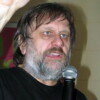Slavoj Zizek

Slavoj Zizek
Slavoj Žižek; born 21 March 1949) is a Slovenian psychoanalytic philosopher, cultural critic, and Hegelian Marxist. He is a senior researcher at the Institute for Sociology and Philosophy at the University of Ljubljana, Global Distinguished Professor of German at New York University, and international director of the Birkbeck Institute for the Humanities of the University of London. His work is located at the intersection of a range of subjects, including continental philosophy, political theory, cultural studies, psychoanalysis, film criticism, and...
ProfessionPhilosopher
Date of Birth21 March 1949
The only ‘realistic’ prospect is to ground a new political universality by opting for the impossible, fully assuming the place of the exception, with no taboos, no a priori norms (‘human rights,’ ‘democracy’), respect for which would prevent us from ‘resignifying’ terror, the ruthless exercise of power, the spirit of sacrifice … if this radical choice is decried by some bleeding-heart liberals as Linksfaschismus, so be it!
Love is what makes sex more than masturbation. If there is no love even if you are really with a partner you masturbate with a partner.
Thinking begins when you ask really difficult questions.
As a Marxist, let me add: if anyone tells you Lacan is difficult, this is class propaganda by the enemy.
Beyond the fiction of reality, there is the reality of the fiction.
A typical guy who buys organic food doesn't really buy it in order to be healthy; he buys it to regain a kind of solidarity as the one who really cares about nature. He buys a certain ideological stance.
Why are so many problems today perceived as problems of intolerance, rather than as problems of inequality, exploitation, or injustice? Why is the proposed remedy tolerance, rather than emancipation, political struggle, or even armed struggle?
Who dares to strike today, when having the security of a permanent job is itself becoming a privilege?
We feel free because we lack the very language to articulate our unfreedom.
When we are shown scenes of starving children in Africa, with a call for us to do something to help them, the underlying ideological message is something like: "Don't think, don't politicize, forget about the true causes of their poverty, just act, contribute money, so that you will not have to think!
I already am eating from the trash can all the time. The name of this trash can is ideology. The material force of ideology makes me not see what I am effectively eating.
The problem for us is not are our desires satisfied or not. The problem is how do we know what we desire.
If you have reasons to love someone, you don’t love them.
Atheism is not the denial of the existence of God, but having doubts as to whether God is conscious.